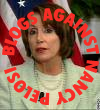From The Israel Project:
Washington, D.C. - A new poll (Word document, Powerpoint) commissioned by The Israel Project (TIP) shows that Israel's image is at a five-year high among U.S. opinion elite. When asked to rate their feelings on a scale of one to 100, in which 1 meant "very cold or unfavorable" and 100 meant "warm/very favorable," Israel received a "warm/very favorable" rating from 63 percent of elite and an average or mean rating of 66. That was an increase of 13 points from a "warm/very favorable rating" from 50 percent and a mean of 61 percent in May 2006.
Iran was rated negatively by 71 percent of those polled and received a positive rating from only 11 percent, with an average or mean rating of 28 percent. Hamas received a cool rating from 71 percent, a warm rating from 6 percent and an average or mean rating of 23 percent on a scale of one to 100.
Support for Israel in the conflict with the Palestinians is also at a five-year high, with 65 percent supporting Israel, while support for the Palestinians remains at 10 percent. This is the largest spread recorded between support for Israel and support for the Palestinians in recent years. Additionally, fully 84 percent of U.S. opinion elite consider Israel one of the United States' strongest allies, an increase of 7 percent since October 2005.
"This poll reinforces the remarkably strong ties Americans have with Israel," Public Opinion Strategies Co-Founder Neil Newhouse said. "Support for Israel among American opinion elite has reached its highest level over the last five years, and more than eight of ten believe that Israel is one of our strongest allies."
Opinion elite agree that even though the Palestinians have formed a unity government with both Hamas and Fatah, the United States should not resume sending aid to the Palestinian Authority until the government "ends the culture of hate (72 percent) and "Hamas recognizes Israel's right to exist and denounces terrorism" (75 percent).
There is a clear sense that Israel is threatened by hostile neighbors that do not accept Israel's right to exist. Of those polled, 85 percent agree that "The Arab countries around Israel are hostile to its existence," while only 11 percent disagree. By a margin of 80 percent to 18 percent, those polled agree that "Israel is a small and vulnerable country threatened by hostile neighbors" and 76 percent agree that "The Arabs don't really accept Israel's right to exist" versus 20 percent who disagree.
Accordingly, 73 percent of those polled agree that "Islamic extremism" is "more responsible for instability in the Middle East" than "Israel and its policies" at only 12 percent.
On the issue of Iran, opinion elite overwhelmingly believe that of all countries, Iran is the most serious threat the United States (92 percent) -- even greater than North Korea, Syria, Sudan and Venezuela. Nearly three-fourths of those polled believe that "Iran should be stopped from developing a nuclear weapon," while only 21 percent believe that "as an autonomous nation, Iran has the right to develop nuclear weapons."
"People are clearly concerned about Iran," TIP Founder and President Jennifer Laszlo Mizrahi said. "And they have good reason for this, because Iran is the world's largest state sponsor of terror."
Additionally, 71 percent of opinion elite believe that investing money in companies that do business in terrorist-sponsoring countries such as Iran is "unacceptable." An additional 21 percent believe that "it may be acceptable for others but not for you personally," while only six percent believe it to be "acceptable."
In recent months, a number of states have begun considering adopting policies against investing state monies in terror-sponsoring countries such as Iran. Florida, for example -- following the model of economic pressure that worked to peacefully change the policies of South Africa - this week may become the first state to pass terror-free investing legislation focusing on Iran and Sudan.
"This is an important step to peacefully change the policies of Iran and Sudan," Mizrahi said. "Hopefully this will save many lives."
The poll of 500 U.S. opinion elite was conducted by telephone April 16-19, 2007 for The Israel Project by Neil Newhouse of Public Opinion Strategies in conjunction with Greenberg Quinlan Rosner Research. The margin of error is +/- 4.38 percent.
The May 2006 poll also referenced above was conducted by telephone May 22-25, 2006 for The Israel Project by Neil Newhouse of Public Opinion Strategies in conjunction with Greenberg Quinlan Rosner Research. The poll consisted of 500 opinion elite.






















